The first decades of the Faculty were marked by a pioneering spirit. After a few years of courses taught piecemeal in lawyer William Badgley’s offices, enterprising students pushed for a more substantial course of study. Their petition to McGill’s administration in 1848 was a principal catalyst for the eventual formal establishment of the Law Faculty in 1853 by Charles Dewey Day. In the years that followed, McGill’s Law Faculty was at the centre of ongoing negotiations and unlikely compromises: graduates and professors were involved in the transition from the seigneurial regime in Quebec, the Lower Canada Rebellion of the 1830s, the codification of the civil law, Confederation, and the development of a Canadian identity that reached beyond the St-Lawrence River. Early figures involved in McGill Law, including John Abbott, Alexander Morris, and D’Arcy McGee, shaped Canada’s role in the British Empire and in the world.
In this period:
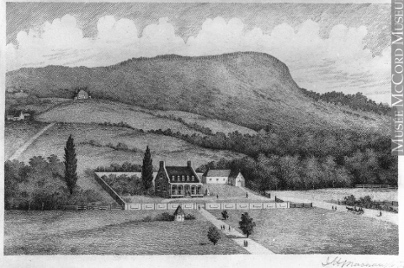
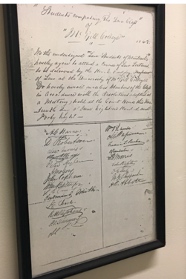
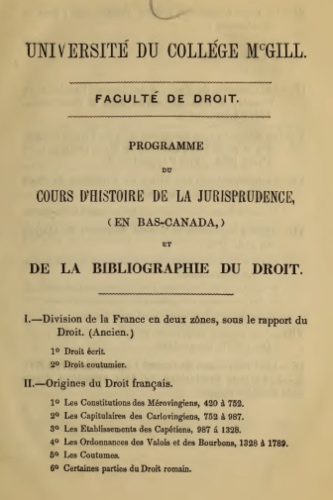
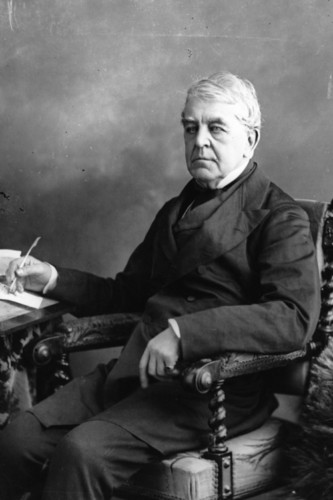
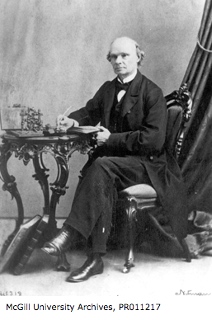
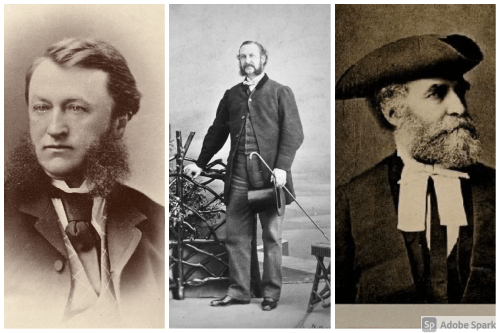
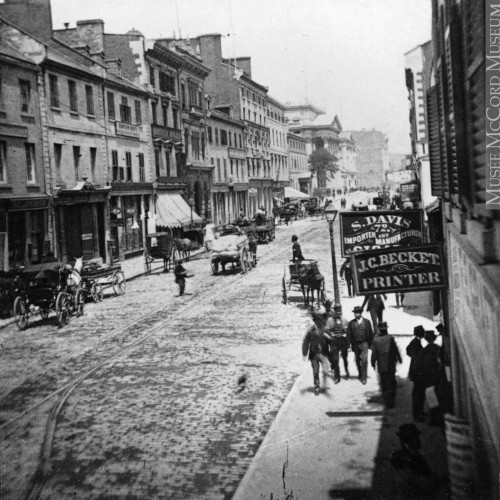
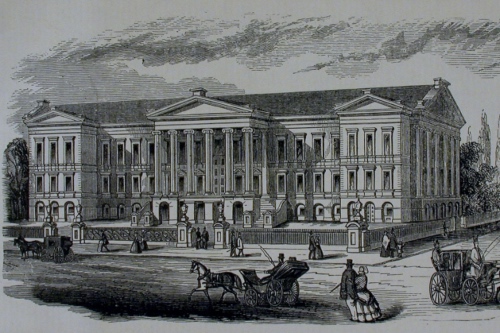
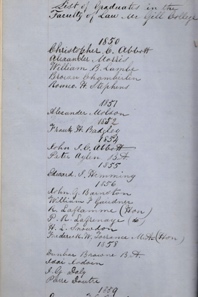

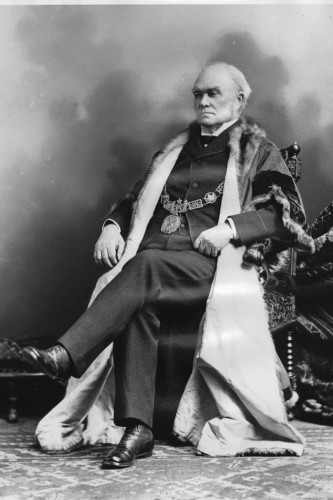
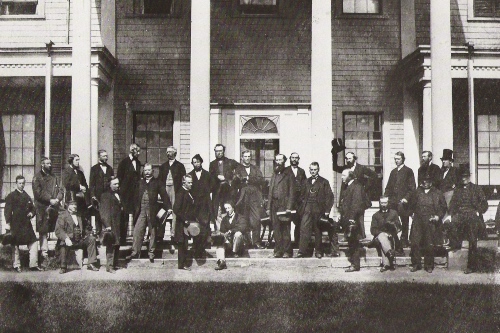
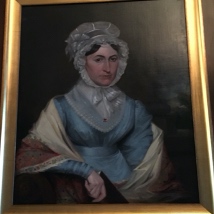
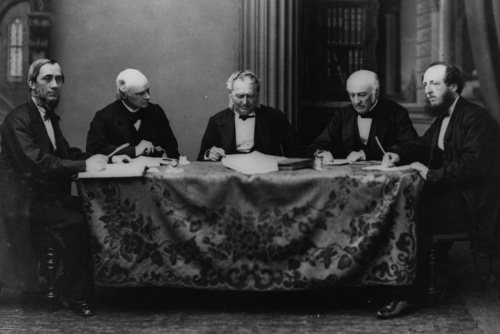
McGill Charter 1821
 McGill’s Law Faculty was only formally established decades after the founding of McGill College; however, to understand the Law Faculty’s development, it is necessary to return to the school’s origins. When James McGill died in 1813, he set aside £10,000 and his 46-acre Burnside Place estate (pictured above, now the site of McGill’s downtown campus) to establish a university bearing his name. Not long after, James McGill’s nephew, Francis Desrivières, initiated litigation to prevent the formation of the school. In spite of Desrivières’s efforts, King George IV granted a Royal Charter establishing “McGill College” in 1821. In the 1820s a principal and four professors were strategically appointed to prove the university existed not only in law, but in fact as well. While Bishop Strachan (who would go on to participate in the founding of Trinity College at the University of Toronto) was named professor of history and civil law in this period, there is no evidence that he ever actually taught at McGill College.
McGill’s Law Faculty was only formally established decades after the founding of McGill College; however, to understand the Law Faculty’s development, it is necessary to return to the school’s origins. When James McGill died in 1813, he set aside £10,000 and his 46-acre Burnside Place estate (pictured above, now the site of McGill’s downtown campus) to establish a university bearing his name. Not long after, James McGill’s nephew, Francis Desrivières, initiated litigation to prevent the formation of the school. In spite of Desrivières’s efforts, King George IV granted a Royal Charter establishing “McGill College” in 1821. In the 1820s a principal and four professors were strategically appointed to prove the university existed not only in law, but in fact as well. While Bishop Strachan (who would go on to participate in the founding of Trinity College at the University of Toronto) was named professor of history and civil law in this period, there is no evidence that he ever actually taught at McGill College.
Because of the ongoing litigation contesting the founding of McGill it was not until 1829—after a favourable Privy Council ruling—that there was a formal inauguration and not until the 1840s that regular operations began.
1848 Petition & Establishment of the Law Faculty

The original demand for a Law Faculty at McGill came from the students themselves. Led by Alexander Morris (B.C.L. 1850, D.C.L. 1862) , 23 students reading law for the Bar of Canada East petitioned McGill’s Vice-Principal to create a complete law programme. Many had been attending lectures given sporadically by William Badgley in his chambers as a complement to their apprenticeships in Montreal’s law firms.
Charles Dewey Day became the Principal of McGill College in 1853 and quickly moved to formally establish the Law Faculty. William Badgley was appointed as the first Dean. John Joseph Caldwell Abbott, Badgley’s junior partner in practice, and Frederick Torrance were the first lecturers.
Bilingual From the Start

McGill Law was bilingual from its earliest days. T.A.R. Laflamme and P.R. Lafrenaye were two of McGill’s first francophone lecturers, hired in the 1850s. Many of the early course selections also reveal a deep respect for both French and English law. Chancellor Charles Dewey Day, who established the Law Faculty, promoted a legal education that drew from a variety of sources. For example, Lafrenaye’s 1855 French-language course on legal bibliography shows a reliance on both French and English texts.
As early as 1875, the Faculty responded to student demands for translations in both languages by expressing a policy of bilingualism that remains an integral part of the McGill Law experience.
Dean Badgley – Law’s First Dean

William Badgley (D.C.L. 1843), a prominent Montreal lawyer, was appointed as the first lecturer of law at McGill in 1844. In 1846, he became a full professor and in 1853, with the establishment of the Law Faculty, he became the first Dean. Badgley authored the pamphlet Representation against the title of the seminary to the seigniory of Montreal (1839) and was a founding member of the Constitutional Association of Montreal, which vocally opposed the patriotes movement. He was a strong advocate of maintaining a constitutional link to Britain and supported the assimilation of French Canadians. He promoted a union of Upper and Lower Canada and the reform of institutions like the seigneurial system.
Over the course of his career, Badgley served as circuit court judge of the district of Montreal, as an early bâtonnier of the Montreal bar, as Attorney General for Canada East, as a member of the legislature, and on the Superior Court of Lower Canada and the Court of Queen’s Bench.
Charles Dewey Day – McGill’s First Chancellor

Charles Dewey Day, the first Chancellor of McGill, was a central figure in the establishment of the Law Faculty and a firm advocate for a pluralistic legal education, which he believed should draw on a diverse range of legal sources. This led him to promote a “universal education,” which included, as of 1856: constitutional law; obligations; civil law; Roman law; a history of French, English and Lower Canadian laws; and international law.
Day left a lasting mark on Quebec society as one of the three commissioners responsible for the codification of the Civil Law of Lower Canada . Over the course of his career, he served as Solicitor General, a member of the Legislative Assembly of the Province of Canada, and a judge of the Court of Queen’s Bench and the Quebec Superior Court. He was also a deputy judge advocate for the patriotes courts-martial after the rebellions and was a member of the Seigneurial Commission of 1856, where he argued that the feudal system had outlived its age.
First Professors

The first cohort of professors included P.R. Lafrenaye, left, who was a leading lawyer at the time and was involved with the controversial Institut Canadien, a group of French Canadian intellectuals who promoted liberal visions of patriotism and culture. His polyjural approach to legal bibliography reflected the pre-codification eclecticism of law in Quebec.
Toussaint-Antoine-Rodolphe Laflamme (B.C.L. 1856, D.C.L. 1873), centre, another member of the first cohort, was a leading lawyer in the province. He was also one of the founders of the Institut Canadien. He served as bâtonnier of the Bar of Montreal, as a cabinet member to Alexander Mackenzie, and was offered—but declined—a seat on the Supreme Court of Canada.
Frederick William Torrance (B.C.L. 1856), right, was an early professor and a member of Montreal’s influential Torrance family. He remained in practice until his appointment to the Superior Court of Quebec in 1868, although he taught at the Faculty until 1872. Torrance left a lasting legacy on the intellectual landscape of Montreal through his involvement in the establishment of the Fraser Institute and the founding of the Montreal Presbyterian College, along his contributions to the early Law Library’s holdings.
Student Life

In the mid-19th century, students spent most of their time apprenticing in lawyers’ offices, such as William Badgley’s on Little St-James Street, pictured above with the Courthouse at the end of the block on the left-hand side. They met in the mornings and evenings for lectures, given by some of the city’s leading lawyers. For decades, the Law Faculty did not have any full-time professors. Lectures were given in a rented-out room in Molson’s Bank from 1854–60 and from 1870–90. Up until the 1940s, law classes moved around between different buildings on McGill’s growing campus (including Burnside Hall, the Arts Building, Dawson Hall, Purvis Hall, and finally to the Ross Mansion, renamed Old Chancellor Day Hall).
The Bar

One of the earliest precursors to the Bar Association was the “Brothers-in-Law-Society,” which William Badgley co-founded in 1827. This exclusive dinner club whose entry fees—and fines for coming late—were paid in bottles of wine, was made up of 15 lawyers who dined together six times a year. Another organization, the Advocates’ Library, served many of the professional needs of lawyers in Montreal. The Advocates’ Library was founded in 1828 by many prominent Montreal lawyers with links to McGill, including Badgley, Samuel Gale, and Charles Dewey Day. In addition to housing a “large and valuable Collection of Books,” the Library organized lectures, technical training, and attempted to structure admission and standards of the profession.
The Bar of Montreal was established in 1849 with the Act to Incorporate the Bar of Lower Canada. William Badgley, the first Dean of the Faculty, served as one of the first bâtonniers. That year also saw the creation of the Quebec Superior Court and the Court of Queen’s Bench (the Montreal Courthouse, now known as the Old Courthouse, is pictured above as it appeared in 1854). The new law introduced regulations for admission and the disciplining of members—decisions which had previously been at the discretion of the courts, governors, and informal organizations such as the Advocates’ Library.
First Graduates

The McGill Faculty of Arts granted the first B.C.L. degrees in Lower Canada in 1850, a full three years before the Faculty of Law was officially established. The first graduating classes were small, often with only a handful of students graduating at a time. Some of the accomplishments of the initial five students from the class of 1850 are outlined below.
Christopher C. Abbott (brother of J.J.C. Abbott), went on to earn the one of the first two D.C.L.s granted in 1862, along with Alexander Morris. Morris, in addition to his other accomplishments, led the initial 1848 petition to call for a more comprehensive law school. William B. Lambe was another signatory of the 1848 petition and went on to become the Inspector of Licenses for the Revenue District of Montreal. Brown Chamberlin went on to be the editor of the Montreal Gazette, to hold the position of Queen’s Printer, and to be a member of the Legislative Assembly. Romeo Stephens appears to have practiced law in Montreal and British Columbia.
Alexander Morris
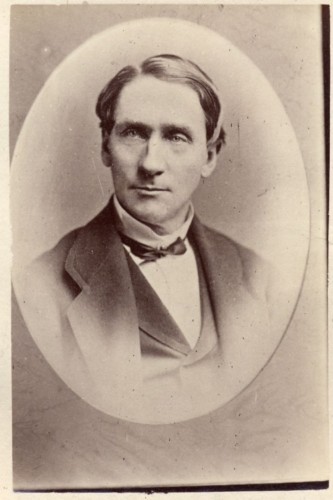 Alexander Morris (B.C.L. 1850, D.C.L. 1862) was in the first cohort of law students at the Faculty and was the first student to be granted a Bachelor of Arts at McGill. As a member of John A. Macdonald’s cabinet, he was an important figure in Confederation, a key negotiator in many of the numbered treaties with the First Nations of Western Canada, and the second Lieutenant Governor of Manitoba and the North-West Territories (1872-1877). Morris’s best-known writings include Nova Britannia: or, British North America, Its Extent and Future and The Treaties of Canada. By the end of his career, he was in constant conflict with Ottawa for what he saw as its failure to fully implement the treaties and its reliance on the flawed doctrine of discovery.
Alexander Morris (B.C.L. 1850, D.C.L. 1862) was in the first cohort of law students at the Faculty and was the first student to be granted a Bachelor of Arts at McGill. As a member of John A. Macdonald’s cabinet, he was an important figure in Confederation, a key negotiator in many of the numbered treaties with the First Nations of Western Canada, and the second Lieutenant Governor of Manitoba and the North-West Territories (1872-1877). Morris’s best-known writings include Nova Britannia: or, British North America, Its Extent and Future and The Treaties of Canada. By the end of his career, he was in constant conflict with Ottawa for what he saw as its failure to fully implement the treaties and its reliance on the flawed doctrine of discovery.
Morris’s legacy remains contested: some argue that over the course of his career he increasingly incorporated Indigenous viewpoints into his work, while others see him as a classical imperialist. The Alexander Morris Exhibition—the Faculty’s first endowed prize—is still awarded to the student with the highest standing in second year.
Prime Minister John Abbott

John Joseph Caldwell Abbott (B.C.L. 1854, D.C.L. 1867) had a successful career as a commercial lawyer in partnership with William Badgley, the Faculty’s first Dean, and through this connection began his teaching career in 1853. Abbott was Dean of the Faculty for 25 years, though this was at best a part-time position, since he concurrently served as mayor of Montreal for two terms (1887–88), as Solicitor General, and as a member of the House of Commons. He was known as one of the most successful lawyers in the Province of Canada, was named Queen’s Counsel in 1862, and twice turned down the Chief Justiceship of Quebec.
He participated in the founding of many landmark English Canadian institutions, including the Fraser Institute and the Art Association of Montreal, which would become the Montreal Museum of Fine Arts. Abbott was the first Canadian-born Prime Minister of Canada, serving from 1891–92 as the leader of the Conservative Party.
D’Arcy McGee

Thomas D’Arcy McGee (B.C.L. 1861) was a newspaper publisher, activist, poet, and politician. He was first elected to the Legislative Assembly of the Province of Canada in 1858, was a member of Macdonald’s cabinet from 1864–67, and remained in government until his death in 1868. McGee had attended McGill as a mature student and, despite being selected to deliver the valedictorian address, accepted his B.C.L. in absentia because his legislative duties kept him in Ottawa. He was an ardent advocate for the unification of British North America: he has been called one of the “Fathers of Confederation” for the influence he had during the Charlottetown Conference and Quebec Conference on Confederation.
McGee was assassinated while in office. He was likely murdered by Fenians fighting for an independent Irish Republic who felt betrayed by his politics. His funeral in Montreal (pictured above, right) was attended by 80,000 people (the population of the city at the time was only 150,000).
Torrance Gold Medal

Elizabeth Torrance is the namesake of the Faculty’s most distinguished award, which recognizes the student with the highest academic achievement in the graduating class. John Torrance, a successful merchant and “patriarch of Montreal”, created the Elizabeth Torrance Gold Medal in memory of his late wife in 1865.
The first Torrance Gold Medal was presented to Norman William Trenholme (B.C.L. 1865) , later a Dean of the Faculty of Law, by Frederick W. Torrance, a professor of Roman law and the son of Elizabeth and John Torrance. Since then, the Medal has been awarded to the top student at the Faculty for over 150 years. The list of winners include Supreme Court Justices, politicians, Deans, professors, and leaders in the legal field.
Codification in Quebec

Charles Dewey Day, one of the most prominent figures in the creation of McGill’s Faculty of Law, left a lasting mark on the development of law in Canada through his leading role on the Commission to Codify the Laws of Lower Canada. Day (second from the left) was appointed in 1859 as one of three commissioners on the Commission. A representative of the Anglophone community on the Commission, Day has informally been credited as its leader.
After seven years, the Commission developed the Civil Code of Lower Canada, which remained in effect from 1866 to 1994. Day is credited with the Book on Obligations and many of the sections relating to commercial matters. The codification was part of a larger process of clarifying and modernizing the laws of Lower Canada and was seen primarily as a technical, rather than political, project.
